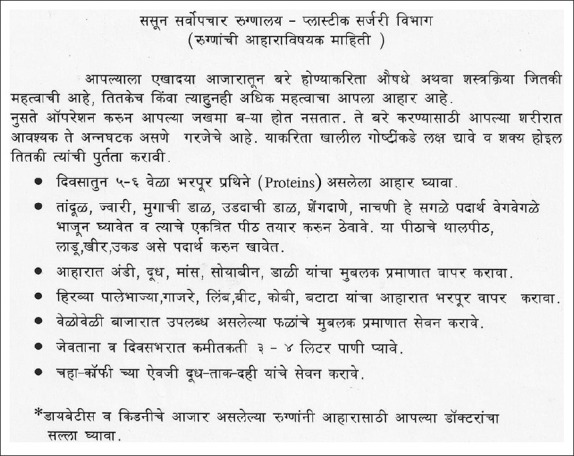Sir,
Sincere compliments to the editorial team for coming up with a brilliant issue on ‘Wound Healing.’ The issue is a ready reference guide and finds an important place on my work desk. Issues ranging from traditional and complementary medicine to stem cells have been deliberated in the issue.
However, it would have been interesting to read an article on nutrition, diet and wound healing. Nutrition is a fundamental and an essential approach in wound healing. It has been proven beyond reasonable doubt that nutrition plays an essential part in wound healing and proper nutritional supplements are essential in preventing unnecessary complications and accelerating wound healing.[1]
David Herndon[2] stresses – ‘Choosing the proper level and source of energy is one of the most critical requirements to the patient recovering from a severe burn injury.’ Large amounts of carbohydrates and fat must be converted to energy to satisfy the requirements needed to nourish the traumatized body and fuel the rapid growth of new cells. An insufficient diet, therefore, can be extremely detrimental to the patient.
Vitamin A is required for epithelial and bone formation, cellular differentiation, and immune function.[3] Vitamin C is necessary for collagen formation, proper immune function, and as a tissue antioxidant.[4] Although the exact role of vitamin E in wound healing is not understood, it appears to involve cell differentiation, epithelialization, cell-mediated immunity, the early inflammatory response, and angiogenesis.[5] Adequate dietary proteins are absolutely essential for proper wound healing.[6] Tissue levels of the amino acids glutamine and arginine may influence wound repair and immune function.[7,8] To promote wound healing in the shortest time possible, with minimal pain, discomfort, and scarring to the patient, it is important to explore nutritional influences on wound outcome [Table 1].
Table 1.
Diet and wound healing

Like in most government institutes, we too have a significant burden of patients. Inspite of our best efforts, a waiting period of upto 3 months is inevitable for elective surgeries. Most of these elective patients are from the lower socioeconomic strata and have undergone previous surgeries/burn injuries/trauma. Understandably they are nutritionally depleted.
We thought of taking advantage of this waiting period for the benefit of our patients. Whenever a patient comes to the Outpatient Department (OPD), role of nutrition in wound healing is stressed upon and the patient is given dietary advice and a pamphlet on the dietary advice [Figure 1] and is requested to adhere to it as far as possible.
Figure 1.

Dietary advice pamphlets provided to the patient in Marathi
During this preparatory phase for surgery, a wholesome and regular diet is advised. We advise consumption of five to six small meals with high protein content. Proteins can be supplied in the form of milk, other dairy products, soya, eggs, meat and other poultry products, legumes and grain.
Plenty of water and fluids are advised to keep the body hydrated.
Consumption of citrus fruits, potatoes and tomatoes are advised for vitamin C supplementation.
Green leafy vegetables, carrots and chicken liver are advised for vitamin A supplementation.
In addition to high protein diet, which is rich in glutamine and arginine, cabbage and beet consumption is advised for glutamine supplementation.
Milk, butter milk and yoghurt are advised to be taken in preference to tea or coffee.
Liberal intake of seasonal fruits is advocated.
Supplements are relied upon to furnish nutrients not readily and sufficiently obtained from foods. We generally prescribe vitamin C, E and B group of vitamins to be initiated 15 days prior to the anticipated date of surgery.
We also stress upon the fact that compliance to the diet and supplements must be made depending upon the affordability of the patient. Patients with systemic illness are advised to consult a dietician.
Controlled studies on the role of nutrition in a clinical setting are difficult as it is not possible to confirm the compliance of the patient to the prescribed diet. It is also not possible to have controls for these types of studies.
It is difficult to create a customized diet for individual patients considering the various factors involved. With the assistance of a nutritional therapist, we have created general guidelines which can be recommended safely to most of the patients coming to our OPD.
We have recently initiated this approach of incorporating diet as a part of the spectrum of management of our patients. Although, it is not possible for us to assess the outcomes of the advice we are giving the patients in a systematic manner, we hope to further refine our approach in the times to come. As of now, based on anecdotal reports from patients who have had previous surgeries without dietary supplementation and recent surgeries with dietary supplementation, we have reasons to believe that proper dietary supplementation definitely helps in better wound healing.
REFERENCES
- 1.MacKay D, Miller AL. Nutritional support for wound healing. Altern Med Rev. 2003;8:359–77. [PubMed] [Google Scholar]
- 2. [Last accessed 2012 Nov 16]. Available from: http://www.totalburncare.com/advances_summary_page.htm .
- 3.Ehrlich HP, Hunt TK. Effects of cortisone and vitamin A on wound healing. Ann Surg. 1968;167:324–8. doi: 10.1097/00000658-196803000-00004. [DOI] [PMC free article] [PubMed] [Google Scholar]
- 4.Shukla A, Rasik AM, Patnaik GK. Depletion of reduced glutathione, ascorbic acid, vitamin E and antioxidant defence enzymes in a healing cutaneous wound. Free Radic Res. 1997;26:93–101. doi: 10.3109/10715769709097788. [DOI] [PubMed] [Google Scholar]
- 5.Taren DL, Chvapil M, Weber CW. Increasing the breaking strength of wounds exposed to preoperative irradiation using vitamin E supplementation. Int J Vitam Nutr Res. 1987;57:133–7. [PubMed] [Google Scholar]
- 6.Thomas DR. Specific nutritional factors in wound healing. Adv Wound Care. 1997;10:40–3. [PubMed] [Google Scholar]
- 7.Wilmore DW. The effect of glutamine supplementation in patients following elective surgery and accidental injury. J Nutr. 2001;131:2543S–9. doi: 10.1093/jn/131.9.2543S. [DOI] [PubMed] [Google Scholar]
- 8.Cantürk NZ, Vural B, Cantürk Z, Esen N, Vural S, Solakoglu S, et al. The role of L-arginine and neutrophils on incisional wound healing. Eur J Emerg Med. 2001;8:311–5. doi: 10.1097/00063110-200112000-00012. [DOI] [PubMed] [Google Scholar]


